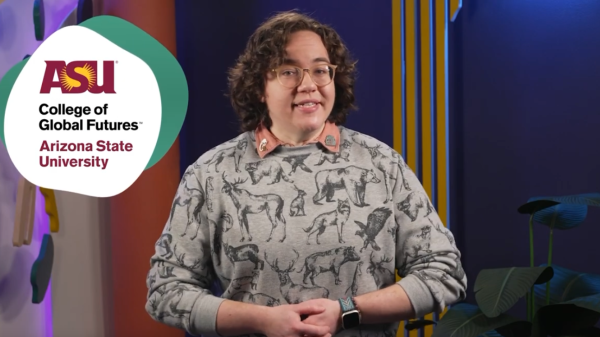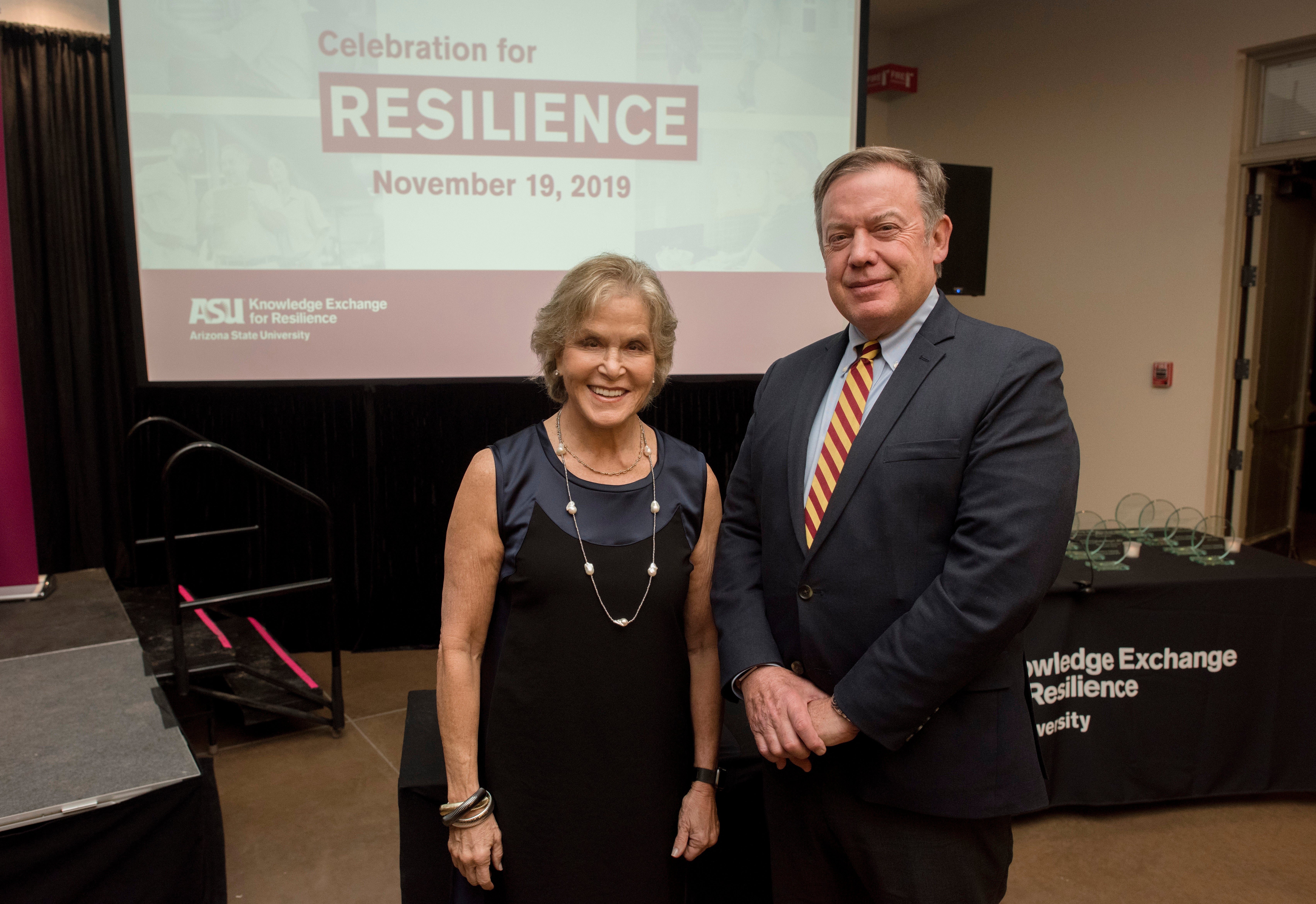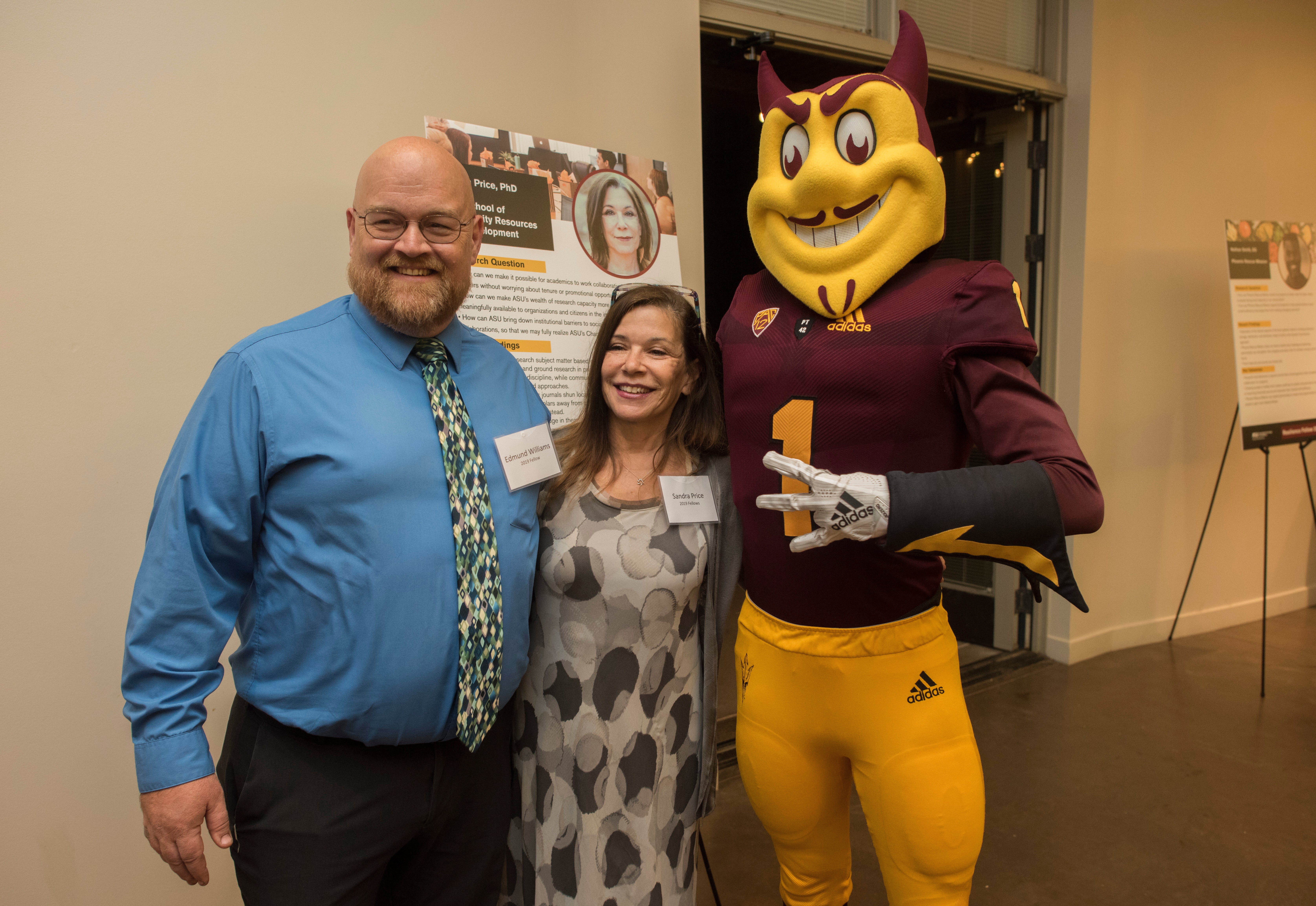'Celebration for Resilience' commemorates the past, present and future vitality of Maricopa County

Arizona’s ability to roll with the punches, which shapes and shifts over time, is largely dependent on proactive planning, swift actions and openness to change, according to an Arizona State University educator.
“I see the word resilience as an adaptive term,” said Elizabeth Wentz, the lead researcher of the Knowledge Exchange for Resilience (KER) initiative and dean of social sciences in The College of Liberal Arts and Sciences at ASU. “It’s always shaping, and we have to retain that awareness because as environmental or economic conditions change, we have the capacity to adapt. So it really isn’t an end state but a continual, ongoing state.”
Wentz and members of the year-old KER initiative explored the topic Tuesday night at Phoenix’s Desert Botanical Garden in front of a crowd of nearly 300 people. Attendees included ASU scholars, staffers, members of the nonprofit community and a sprinkling of donors and city officials from Phoenix, Surprise and Scottsdale.
The “Celebration for Resilience” event explained the mission of KER, recognized their 2019 milestones and introduced the new class of 2020 fellows, a “knowledge exchange” of representatives from all sectors tasked with identifying vulnerabilities in their communities and throughout Maricopa County.
According to Wentz, their work is to advance social cohesion, promote economic prosperity and enhance environmental security to create profound and enduring change that brings “resilience dividends.”
KER also awarded the inaugural Resilience Prize to the city of Scottsdale’s Indian Bend Wash Greenbelt, an 11-mile oasis located in the heart of Scottsdale that serves as more than just a beautiful recreation area for residents. The greenbelt’s primary function is as an efficient flood-control system. Scottsdale resident Bill Walton's newspaper column in the Scottsdale City Progress helped to launch the project in the 1970s. He later became the city’s planning director.
The Virginia G. Piper Charitable Trust gave $15 million to launch KER in late 2018. Its mission is to build resilient communities in Maricopa County by sharing knowledge, discovering vulnerabilities and responding to challenges together.
By embedding in the communities of Maricopa County and tapping the expertise of research scientists, citizen scientists, community members and partnership organizations, KER was designed to become a community resource and address pressing issues and needs, fostering positive change and building resilience.
Mary Jane Rynd, president and CEO of the Piper Trust, said the gift was perfectly matched for KER because of its mission.
“Virginia’s commitment to progress aligns so well with the Knowledge Exchange for Resilience and its mission, which is to share knowledge and solve problems together — all of them,” Rynd said.
Keynote speaker Judith Rodin poses for a photo with ASU President Michael Crow at the Celebration for Resilience on Nov. 19. Photo by Laura Segall
Arizona State University President Michael M. Crow said the initiative is vital to ensuring the state’s long-term future growth and progress.
“Maricopa County is now about 4 1/2 million people, roughly the size of Ireland, and it’s going to be growing to 6, 7, 8 million people by 2050,” Crow said. “It’s absolutely essential that we build a modern university that can connect everybody and then begin thinking about resilience. If we do that, we’ll be OK. If we don’t do that, we won’t be OK.”
The initiative is making a pretty good dent so far. In 2019, they engaged 100 community partners and created data-driven models and prototypes that addressed themes such as heat, food, youth, shelter, economic security and health and aging.
Jennifer Vanos, a 2019 fellow and an assistant professor in ASU’s School of Sustainability, spent the last year working on a 17,000 square-foot sustainable playground called a “Natural Outdoor Play and Learning Area” at Paideia Academy and Preschool in Phoenix.
The space would be comprised of grass, trees, hedges, mulch, hills, tunnels, caves, walls, gardens and a sand box, Vanos said. Additionally, the play space also comes equipped with a weather station on the roof, which measures temperature, humidity, radiation, wind speed, nitrous dioxide and particulate matter.
“There’s a lot of benefits to bringing natural spaces into urban areas in addition to the different types of learning opportunities this type of space can provide,” said Vanos, who said the playground could also mitigate noise, pollution and shade as well as provide lessons for students on ecology, weather and math.
There are also lots of lessons to be learned about resilience when it comes to the relationship between homelessness and prisons, said Adonias Arevalo, a 2019 fellow who is the community impact manager with Valley of the Sun United Way.
Last year Arevalo worked on a database on how to decrease prison reentry from people who experienced homelessness.
“People who are experiencing homelessness enter local jails after three-to-five violations through a variety of reasons — trespassing, sleeping on the streets or sidewalks, many minor crimes,” Arevalo said. “Arizona is the fourth largest prison population in the country, and we have a lot of work to do when it comes to prison reform.”
Arevalo said working with local policymakers can change this outcome, increase affordable housing in Maricopa County and improve eviction rates. He said more than 50,000 people were evicted from their residences last year and that housing them in jails or prisons is more expensive than housing them in shelters and affordable housing units.
“We have to create more investment into housing, case management, resources and how to deal with this on a more humanitarian level, especially those who are facing mental health issues,” Arevalo said.
Sparky was on hand at the resilience event to mingle with guests, including 2019 fellow Edmund Williams (left) and Sandra Price. Photo by Laura Segall
Wentz said the 2020 fellows will be expanding the definition of resilience by looking into areas of energy, security, disease, transportation, urban farms and food access.
Food access is important to 2020 fellow Terra Rose Ganem, who is the director of Brilliant Planet. Her Mesa, Arizona-based nonprofit is dedicated to seeding and sowing an organic living laboratory that feeds families who suffer from food insecurity challenges by helping them grow more than 75 different types of food and edible plants.
“Resiliency offers an opportunity for action and a positive spin on the challenges of the world today,” said Ganem, whose organization has a long term lease on a one-acre plot of land near the intersection of Power and McDowell roads on a county island in Mesa. “We really want to create an area where people can see what’s possible. Until we see it sometimes, we don’t actually know what we’re capable of. These people can create food and economic security for themselves.”
Libraries are also looking for ways to survive and stay relevant said 2020 fellow Michael Simeone, who is the director for data science and analytics at ASU Library.
“I’m interested in learning how libraries are related to community resilience,” said Simeone, who will be collecting data on local libraries and interviewing staff members. “If we’re looking at resilience as an ability to endure hardship and spring back in a more adaptive form, libraries do this in a way that people don’t always appreciate. They educate people so they can have more economic ability, they give access to knowledge and resources, and they are hubs for free information. All of these things have a key relationship to resilience.”
Keynote speaker Judith Rodin, the former president of the Rockefeller Foundation, praised Crow as a national “thought leader” and saluted the initiative in her remarks.
“ASU has the power to be a great agent of change and must serve as a model of civic engagement for students and its neighbors,” said Rodin, who wrote “The Resilience Dividend: Being Strong in a World Where Things Go Wrong in 2014. “In today’s dizzyingly complex world, universities have a tendency to isolate everyone in their ivory towers. Over the past decades, a host of universities like ASU have breathed new life into their communities.”
Top photo: Elizabeth Wentz speaks at the Celebration for Resilience event Tuesday, Nov. 19, at the Desert Botanical Garden in Phoenix. Photo by Laura Segall
More Environment and sustainability

Floods linked to rise in US deaths from several major causes
New research, co-authored by Arizona State University Assistant Professor Aaron Flores and published in Nature Medicine, uncovers a concerning link between severe flooding and increased…

ASU partners with education production company to share research with online learners
Through Arizona State University’s partnership with Complexly education production company, the online educational initiative Study Hall has forged a new pathway for students to earn college credits…

First-year students get immersive cultural, sustainability lessons in Costa Rica
Studying abroad can be a life-changing experience for any student, let alone a new student who just completed their first semester in college.That's what more than 50 Arizona State University…

